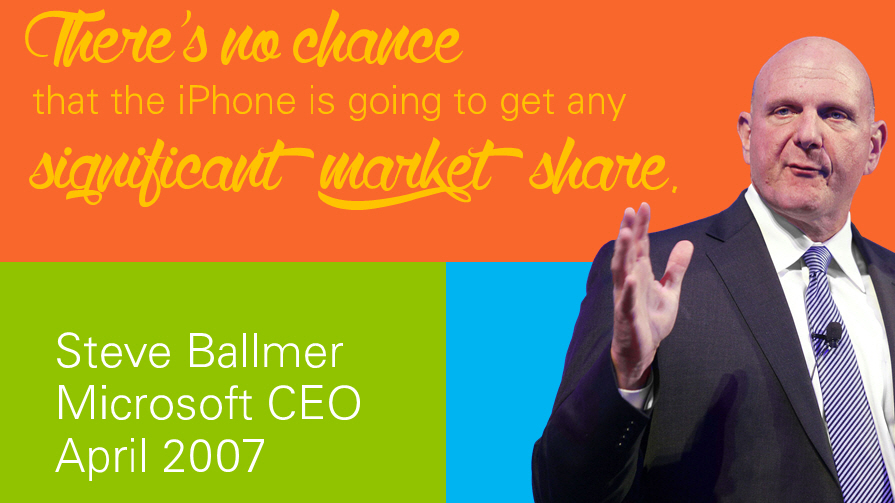Skip to content
Strategic Blunders – A New Series

(Picture comes compliments of Steve Douvas who shared it at Reconverge:G2 Austin)
My friend Alan Michaels turned me on to this commencement speech by Silicon Valley guy Steve Blank that was posted on LinkedIn.
Blank opened his address by polling his audience about their cell phone preferences. He used this to make the humbling point about innovation and the rate of change. He let the audience demonstrate just how much has happened with telephonic communication in the short space of 7 years.
Nokia came and went. Blackberry flew high and is now going down in a fiery crash.
Meanwhile, iPhone and Android rose to the top despite early prognostications that they would never be more than niche plays. In fact, the advent of Smart Phones has eclipsed the very term “cellular” … moving the ball well beyond bouncing digital voice signals off metal towers.
Over this landscape sits the pall of the increasingly silly behemoth Microsoft. They saw it all coming but dismissed the innovation out of hand. They played weakly on the corners (e.g., Windows Phone). And now they’ve doubled down by buying Nokia’s handset business. (Good coverage here and here.)
What gives?
Sadly, Microsoft shows the signs typical of many a great technology company that can’t get past their cash cow (Windows) and recapture the spark of innovation that made them leaders in their fields.
The Microsoft situation may actually be worse.
Starting with the original import of Bob Herbold, Microsoft learned how to be a “corporation” by adopting many of management systems and processes of established companies like Procter & Gamble. But sadly, it picked up the practices of largely second rate IT organizations and power hungry financial types whose primary skill was putting the “process” and “scorecard” to everything.
Rigorous management control appears to have reinforced the worst instincts in Bill Gates’ personality and has served to kill whatever entrepreneurial urges lived inside the technical minds of Microsoft innovators. After all these years and so many promising ideas, Microsoft is still just a Personal Computer software company whose cash flow is tethered to a relentlessly shrinking product category.
As this series develops, we will explore why great companies fail to recognize and grasp sea changes. We will look at resolving the inherent conflict between running profitable business lines and stepping off in new directions. And we will discuss how strategy and intelligence professionals can play a key role in making their organizations more change-friendly.
Your comments and stories will make the ride a fun one!
Share This Story, Choose Your Platform!

Maybe the geniuses at Microsoft are onto the idea of the “$35 Smartphone Revolution”? See Andy Kesler’s piece in today’s WSJ: http://online.wsj.com/news/articles/SB10001424052702304101504579546393363686978?mg=reno64-wsj
Excellent analysis of Microsoft’s business. Nat Brooks, who I worked with for many years at P&G, is a highly talented individual in business intelligence and business strategy development. His in-depth knowledge of the competitive landscape is very insightful and is extremely valuable in predicting the likely future of product and marketing development.
Thanks Mohammed for the very kind comments.
[…] opened this series knocking Microsoft for missing the Smart Phone revolution. Today, let’s plunge the knife a little […]